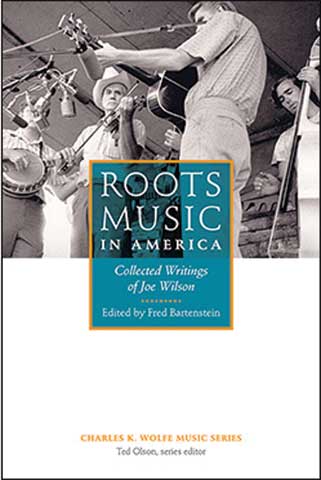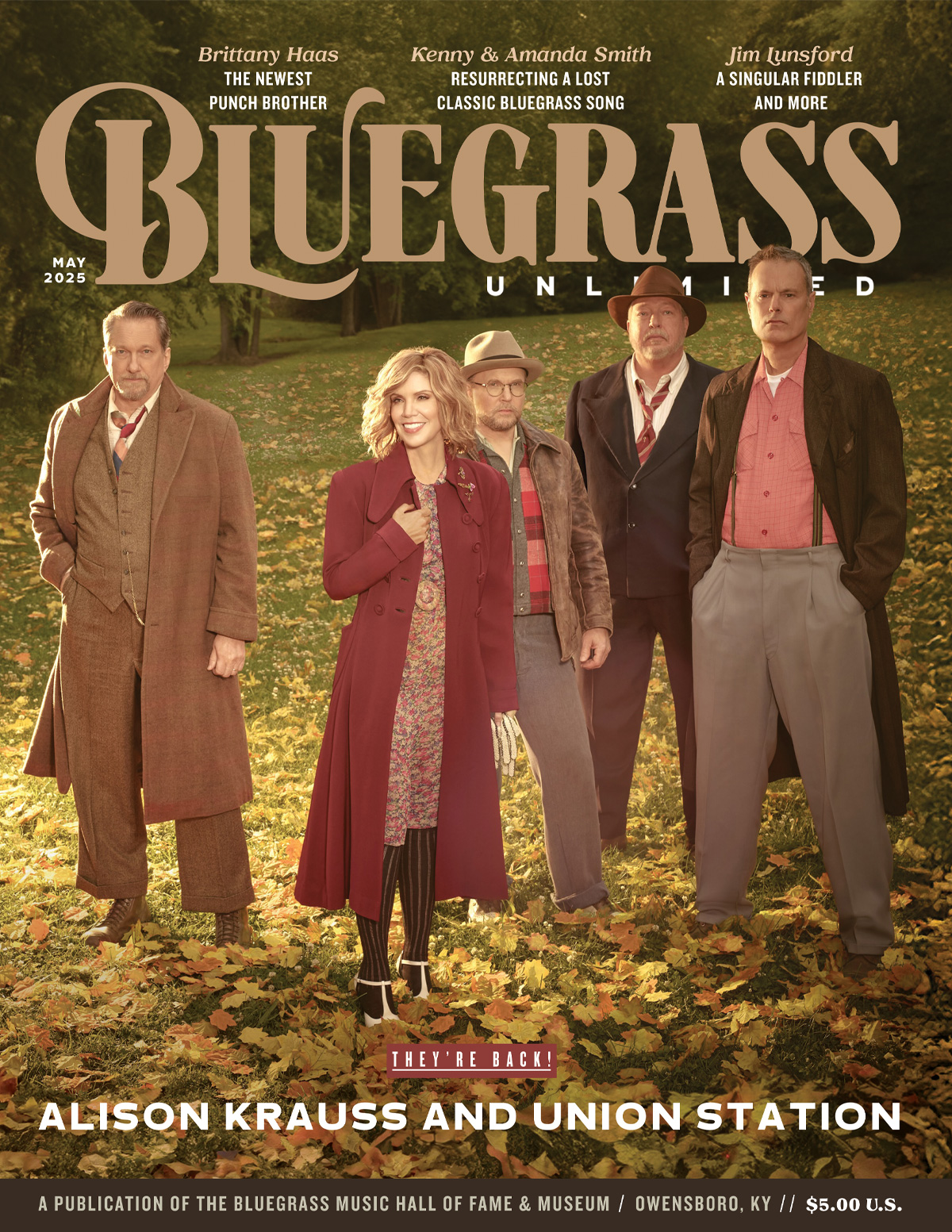ROOTS MUSIC IN AMERICA
 ROOTS MUSIC IN AMERICA: COLLECTED WRITINGS OF JOE WILSON—EDITED BY FRED BARTENSTEIN—Univ. Of Tenn. Press 9781621903154. Paperback, $29.95.
ROOTS MUSIC IN AMERICA: COLLECTED WRITINGS OF JOE WILSON—EDITED BY FRED BARTENSTEIN—Univ. Of Tenn. Press 9781621903154. Paperback, $29.95.
LUCKY JOE’S NAMESAKE: THE EXTRAORDINARY LIFE AND OBSERVATIONS OF JOE WILSON—EDITED BY FRED BARTENSTEIN—Univ. Of Tenn. Press 9781621903161. Paperback, $29.95. (Univ. of Tenn. Press, 110 Conference Ctr., 600 Henley St., Knoxville, TN 37996, www.utpress.org.)
Who was Joe Wilson? The literary answer is that Wilson may have been the best all-around writer ever about bluegrass, old-time, and country. Joe’s style was both witty and scholarly, informed by an almost unmatched combination of knowledge, insights, humor, and sheer exuberance for the music and performers he knew and loved so well.
The biographical answer is that Joseph Thomas Wilson was born in Creston, N.C., on March 16, 1938. He grew up near Mountain City in eastern Tennessee and passed away on May 17, 2015, in Winston Salem, N.C. In between, he lived a life of music, activism, and writing. He was the real deal, steeped in ballad singing, storytelling, and shape-note singing of his childhood. Marvelously, his adult careers included being a door-to-door salesman, newspaper journalist, New York City advertising consultant, and Nashville country music producer.
Joe Wilson may be best known as executive director from 1976 to 2004 of the National Council For The Traditional Arts, based in Silver Spring, Md. Founded in 1933, this non-profit is the oldest continuing operating American organization dedicated to documenting and presenting folk arts. While at the NCTA, Wilson revitalized the National Folk Festival, among many other lasting contributions. Late in life, Wilson was the director and guiding force of the Blue Ridge Music Center in Galax, Va. After “retiring,” he remained on the NCTA board of directors.
Now come these two superb new companion books, Roots Music In America, with a profound range of articles, reporting and scholarly essays, and Lucky Joe’s Namesake, featuring reflections on his heritage, personal musings, statements, and priceless utterances, with appreciations by friends. These volumes have been beautifully produced by the Charles K. Wolfe Music Series of the University of Tennessee Press and loving and perceptively edited by Fred Bartenstein, himself an author or editor of numerous landmark articles and books on bluegrass and country music.
Oh, how Joe Wilson wrote! How good was he? Numerous selections from either book could stand with the celebrated writing in such prestige-name magazines as The New Yorker, Vanity Fair, or Rolling Stone. Consider a concise, pungent accounting of the hardscrabble fortunes of a touring traditional musician—in this case, Doc Watson, but Wilson could have been writing about ten thousand others: “When the hotel has had its due, the airline its fare, and the ptomaine taverns their share for three days, what is left for wife and children? Fame? Fame, understanding, goodwill, peace, applause, and love all have their place, but cannot be brought to a boil in a soup pot.”
Joe Wilson’s wit and wisdom were well represented in the pages of Bluegrass Unlimited. From the May 1988 issue comes “Rachel And The Eighth Of January.” Wilson hooks us in the opening paragraph, revealing that a “sprightly little tune called ‘Rachel’ honors the memory of a musician…notable for courage, great beauty, and for a considerable posthumous influence upon the political affairs of the United States.”
And how can you resist essays with titles such as “Grizzly Ropers And Bald Grazers” or “Confessions Of A Folklorist?” Or how appropriately the twin histories of two of the most vibrant and internationally beloved genres of American music get their due in “Blues And Bluegrass: Tough Acts Of The Underclass.” Wilson’s 2006 book/CD project A Guide To The Crooked Road: Virginia’s Heritage Music Trail was a classic, and it provides some of the pithiest and most enlightening of the essays. Similarly, from the program guide of the 1986 Festival Of American Folklife comes “Country Music In Tennessee: From Hollow To Honky Tonk,” as fine a celebration and getting-the-record-straight primer about that most geographically and historically central of Southern sounds.
Wilson is by turns affectionate about the culture that produced such joyful music, then impatient and indignant about oft-repeated myths (for example, that bluegrass is an Appalachian music; Joe points out that Bill Monroe and his earliest sidemen hailed from nowhere near that part of the South). Wilson was no shrinking violet: Horticultural comparisons to his writing might breed a hybrid of wild rose, morning glory, and cactus. Authors sometimes felt his prickliest thorns. But in subsequent publications or in private correspondence, Joe offered bouquets of apology and appreciation-bloomed reappraisals. Editor Bartenstein has included a few charming then-and-later examples.
Wilson did not fall far from his family tree, at least in spirit. The title of the second, more biographical volume was inspired by great-grandfather “Lucky Joe” Wilson, a Civil War veteran and horse thief who, according to one tale, in 1884 escaped both death and the sheriff to make it back to his homeland mountains of East Tennessee.
Among the shiniest jewels that Bartenstein has retrieved and polished are several unpublished essays and articles. “When Willie Came To Town” is just outstanding, a hilarious, uncensored eyewitness account of Willie Nelson’s first night in Nashville. (Fred has done history the additional yeoman’s service of confirming or correcting the basic facts of this astonishing tale.)
I don’t get a penny from these books’ publisher to make this endorsement. That being understood, I say: If you’re passionate about our music, its history, and the struggles and glories of the people who made it, you simply must have these books in your collection. And you probably know someone who’d enjoy one or the other as a gift. Like hearty holiday buffets, both Roots Music In America and Lucky Joe’s Namesake can be sampled at their beginnings, middles, or endings. Very highly recommended.RDS
